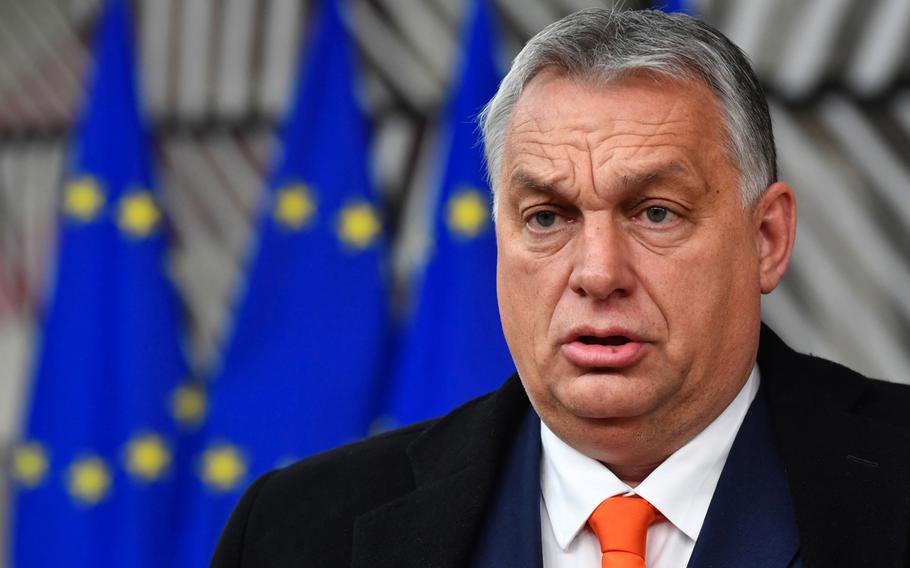
Viktor Orban, Hungary’s prime minister, speaks to journalists as he arrives at a European Union leaders summit in Brussels on Dec. 10, 2020. (Geert Vanden Wijngaert/Bloomberg)
The European Union approved a sixth package of sanctions including a partial ban on Russian oil imports after Hungary dropped objections that had been holding it up for weeks.
EU ambassadors meeting on Thursday backed the measures, which would represent the EU’s toughest yet and are aimed at curbing Russia’s ability to finance the war in Ukraine, France, which holds the EU presidency, confirmed on Twitter.
The measures would forbid the purchase of crude oil from Russia delivered to member states by sea in six months and refined petroleum products in eight months. Pipeline crude would be temporarily spared as a concession to Hungary and other landlocked countries, which rely on Russian supplies through the Druzhba pipeline.
The sanctions package will also see Russia’s biggest bank, Sberbank, cut off the international payments system SWIFT. The same restriction also targets Credit Bank of Moscow and the Russian Agricultural Bank. The measures will be adopted once they are published in the EU’s official journal.
Sanctions in the EU require the unanimous consent of its 27 nations and Hungarian Prime Minister Viktor Orban had blocked the latest package of measures for weeks.
EU envoys agreed to drop Patriarch Kirill, who heads the Russian Orthodox Church and has been a vocal supporter of President Vladimir Putin and his war in Ukraine, from the EU’s proposed list of sanctioned individuals, according to people familiar with the matter.
Orban first demanded his removal in early May but it wasn’t discussed at a meeting when EU leaders met on Monday, the people said. His demand angered many EU ambassadors but they ended up accepting Hungary’s demand to ensure adoption.
Hungary’s intransigence may have destroyed any remaining goodwill with the other 26 members of the EU, one of the people said, adding that Budapest will be more isolated than ever.
The package includes a ban on insurance related to shipping oil to third countries, which will take effect six months after the formal adoption of the measures, and aims to restrict Moscow’s options to divert its supplies elsewhere in the world.
During the meeting of EU leaders on Monday, the bloc granted assurances that Budapest could source alternative oil supplies should Hungary’s pipeline deliveries be disrupted.
EU leaders also made clear earlier this week that this may be the last major package of sanctions for a while as many aren’t ready to target Russia’s revenue from natural gas sales. “This package is a big step forward, we should pause it right now,” Belgian Prime Minister Alexander De Croo told reporters earlier this week, calling a gas embargo “way more complicated.”
Other measures in the proposed EU sanctions package include:
- Banning the ability to provide consulting services to Russian companies and trade in a number of chemicals.
- Sanctioning Alina Kabaeva, a former Olympic gymnast who is “closely associated” with Putin, according to an EU document.
- Sanctioning dozens of military personnel, including those deemed responsible for reported war crimes in Bucha, as well as companies providing equipment, supplies and services to the Russian armed forces.